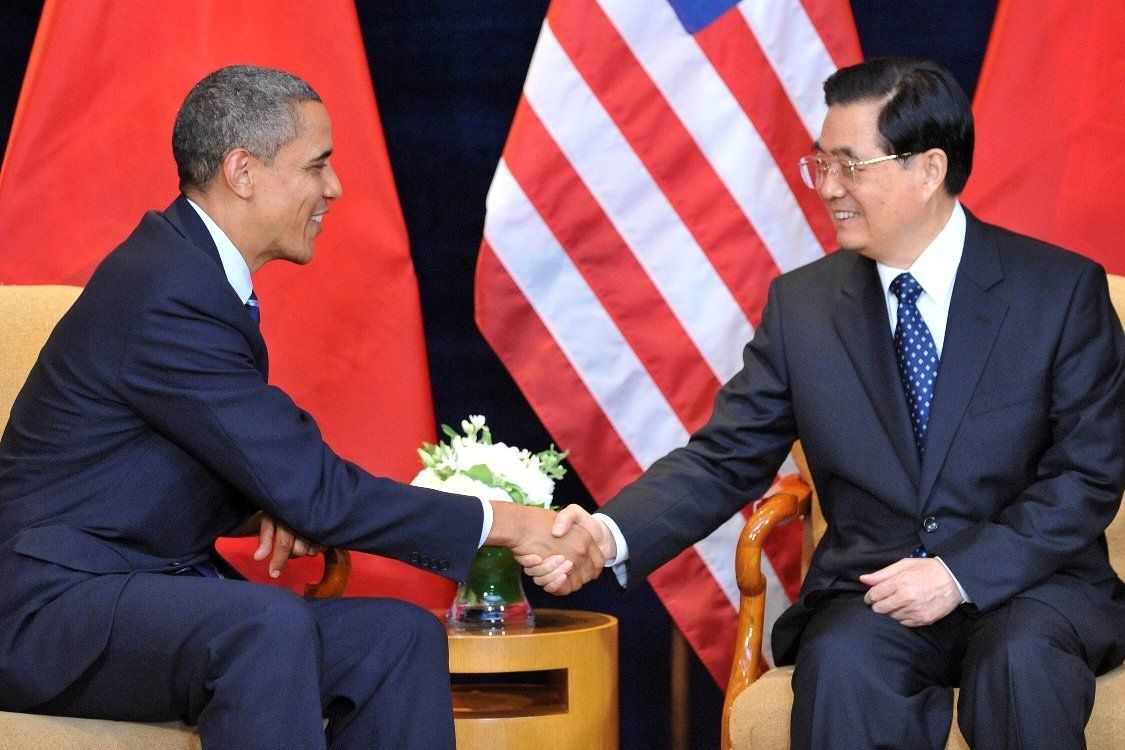
Later today, Chinese President Hu Jintao will land in Washington and begin a three-day visit to America that will include extravagant feting at the White House.
Hu is in town to discuss the long and complicated list of issues between the U.S. and China. The timing couldn't be more complicated as fears that the global recovery could still stall, and is stalling, are in the air. In fact, of all the heads of state President Obama has welcomed to town, Hu may be the one whose visit is most consequential. Many questions about the world's future start in Beijing. And questions about global innovation, greenhouse-gas emissions, and North Korea's plans for nuclear development have long been the source of tension between China and the U.S.
Here's a look at the issues that matter that Obama and Hu will discuss:
Economy
China is the world's second-largest economy and the second-largest manufacturer, both behind America. That's a great accomplishment for a country that's still developing. Yet China is now edging up to America's global dominance in manufacturing (yes, America is still No. 1), and that has implications for both countries. Each is the largest importer of the others' goods, which depends on continued growth, but it also depends on equitable currency. Many Washington officials suspect China has been manipulating the value of its currency, the yuan, to gain a global advantage. Several senators, as well as Treasury Secretary Tim Geithner, are prepared to ask Hu to stop the manipulation.
Intellectual property
American patents and copyrights have never been protected fiercely abroad. But China may be one of the most challenging regions. American copyrights and patents are frequently ignored by Chinese manufacturers, who traditionally have had few qualms about making popular American goods for cheaper. It's made for a robust bootlegging market around the world, to the chagrin of American patent and copyright holders. "China remains behind the rest of the world" in safeguarding intellectual property, Ken Wasch, president of the Software & Information Industry Association, told the AP. In a bit of foresight, China arrested 4,000 bootleggers over the past few months to show its seriousness about making changes.
Climate change
In 2007, China overtook the U.S. as the world's largest emitter of carbon dioxide. As the U.S. continues to try to rethink emissions—and as the federal government begins to crack down on companies that emit the most—progress truly depends on global participation. At the Copenhagen climate conference in 2009, and in Cancun last month, U.S. officials tried to get Beijing to commit to policies that would limit emissions. No binding agreement was made, though. Once economic issues are dealt with, expect Obama to try one-on-one with Hu.
Technology
From the iPhone to new solar panels, the U.S. still leads in developing new technology. China wants in on the innovation process in America, which is more open and streamlined than almost anywhere else. Hu has spoken about getting his country's investors more access to American markets and products before. But granting that kind of request is complicated for Obama. Pushing to loosen taxes on foreign investment and technology collaboration could be seen as turning his back on American investors to benefit Chinese ones. Ergo, a White House official says, discussions about access to U.S. markets are lower on their list, and may be used as leverage on other issues.
North Korea
When it comes to global security, nothing is more consequential than China's relationship with the hermit state. Beijing is currently the closest, and actually the only, real friend of the North's regime. Last month, during an unofficial visit to Pyongyang, former New Mexico governor Bill Richardson spoke with officials about granting access to nuclear-enrichment facilities to inspectors from the International Atomic Energy Association—the Austria-based body that oversees global nuclear development. Obama will want to know the North's response to many of the world's demands for inspection, as well as the status of leader Kim Jong Il's plans for succession of power to his son.
Will all of this be addressed? Probably not. State visits are often glitzy affairs with ample photo ops and smiling back slaps. But even if superficial, Hu's visit is symbolic in important ways. According to Arthur Kroeber, editor of China's Economic Quarterly in Beijing, in talking with NPR, "The question about the summit is not will it achieve this or that specific goal, but will it create a tone, a positive tone, for the relationship."
This article orginally appeared on the Daily Beast.
Uncommon Knowledge
Newsweek is committed to challenging conventional wisdom and finding connections in the search for common ground.
Newsweek is committed to challenging conventional wisdom and finding connections in the search for common ground.
About the writer
To read how Newsweek uses AI as a newsroom tool, Click here.





